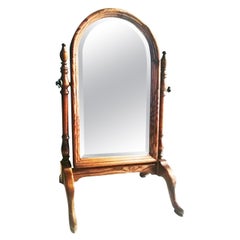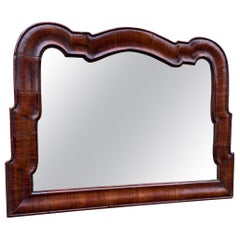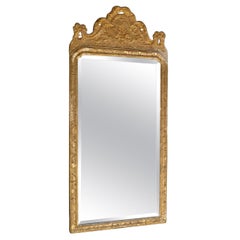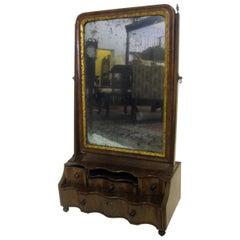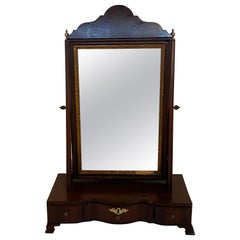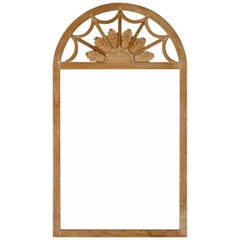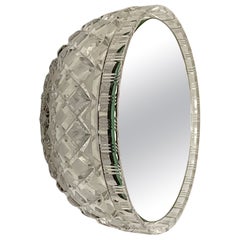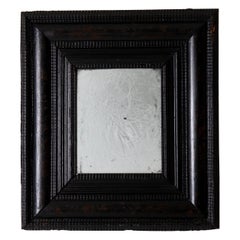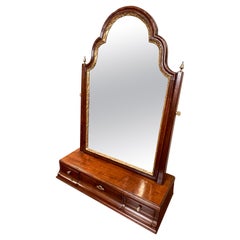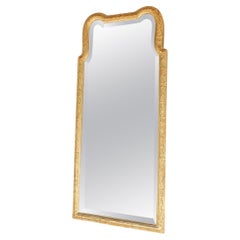Queen Anne More Mirrors
Although named for the last Stuart monarch of England, antique Queen Anne furniture, with its curvy cabriole legs and pad feet, has its origins in the earlier reign of King William III, which began in 1689 and ended with his death in 1702. Later evolving during Anne’s rule from 1702–14, the style would continue to influence design in the decades after her death.
Sometimes called late Baroque or early Georgian, Queen Anne chairs, bedroom furniture and tables are subdued yet ornate and characterized by a graceful blend of influences ranging from Asian design to classical motifs. Furnishings of this era — with their curvilinear supports and novel emphasis on comfort and versatility — are marked by a shift away from the more opulent and angular William and Mary style.
Chairs designed in the Queen Anne style are more functional and lightweight than their predecessors. They often feature a vase or fiddle-shaped splat, which refers to the central vertical back element, in order to support the spine and plush cushions. Craftsmen of the era predominantly worked in walnut, maple and pine. Any embellishments they introduced in their furnishings were frequently minimal and refined and expressed by way of modest flourishes such as shells or scrolls. Some pieces were more lavish with “japanned” finishes, or varnished interpretations of East Asian lacquer art. Almost every piece of furniture, whether a tea table or desk, included S-shaped, animalistic cabriole legs that end in a paw or claw-and-ball form.
These qualities made Queen Anne furniture popular throughout Europe and North America. Boston and Philadelphia became hubs for the production of this style of furniture, spurred by the arrival of British artisans who fostered a market for well-heeled colonists. While the showier Chippendale style later surpassed it in popularity, Queen Anne’s simple elegance still draws an enduring appreciation.
Find a collection of antique Queen Anne dining tables, seating, cabinets and other authentic period furniture on 1stDibs.
Early 20th Century French Queen Anne More Mirrors
Wood
18th Century Dutch Antique Queen Anne More Mirrors
Nutwood
1750s English Antique Queen Anne More Mirrors
Gesso, Glass, Wood, Giltwood
1740s British Antique Queen Anne More Mirrors
Brass
Early 19th Century American Antique Queen Anne More Mirrors
Mirror, Wood
Late 20th Century American Queen Anne More Mirrors
Mahogany
Early 18th Century English Antique Queen Anne More Mirrors
Giltwood
21st Century and Contemporary German Queen Anne More Mirrors
Glass, Mirror
Late 17th Century European Antique Queen Anne More Mirrors
Wood
21st Century and Contemporary German Queen Anne More Mirrors
Glass, Mirror
21st Century and Contemporary Vietnamese Queen Anne More Mirrors
Mirror
Late 18th Century English Antique Queen Anne More Mirrors
Sycamore, Harewood
20th Century Italian Queen Anne More Mirrors
Giltwood, Mirror
21st Century and Contemporary German Queen Anne More Mirrors
Glass, Mirror
Late 19th Century French Antique Queen Anne More Mirrors
Bronze
1780s Italian Antique Queen Anne More Mirrors
Walnut
1790s English Antique Queen Anne More Mirrors
Wood
Early 20th Century French Queen Anne More Mirrors
Brass
1980s American Vintage Queen Anne More Mirrors
Poplar
Early 18th Century English Antique Queen Anne More Mirrors
Walnut
1750s English Antique Queen Anne More Mirrors
Gesso, Glass, Wood, Giltwood
Early 18th Century English Antique Queen Anne More Mirrors
Walnut
1710s English Antique Queen Anne More Mirrors
Wood
Early 20th Century French Queen Anne More Mirrors
Walnut
1710s English Antique Queen Anne More Mirrors
Lacquer
Early 18th Century English Antique Queen Anne More Mirrors
Walnut
18th Century English Antique Queen Anne More Mirrors
Walnut, Mirror
17th Century American Antique Queen Anne More Mirrors
Composition
18th Century English Antique Queen Anne More Mirrors
Early 1800s British Antique Queen Anne More Mirrors
Walnut, Burl
